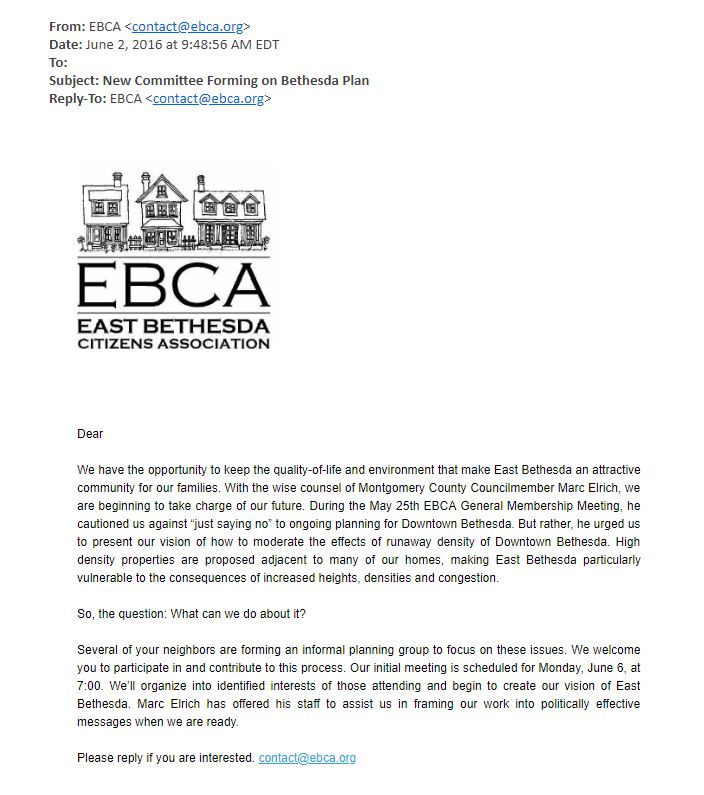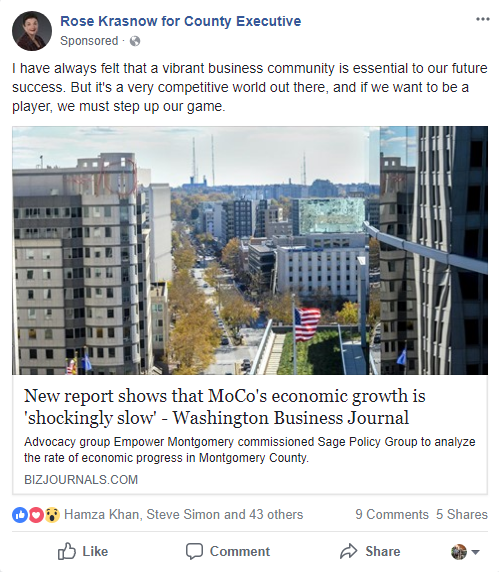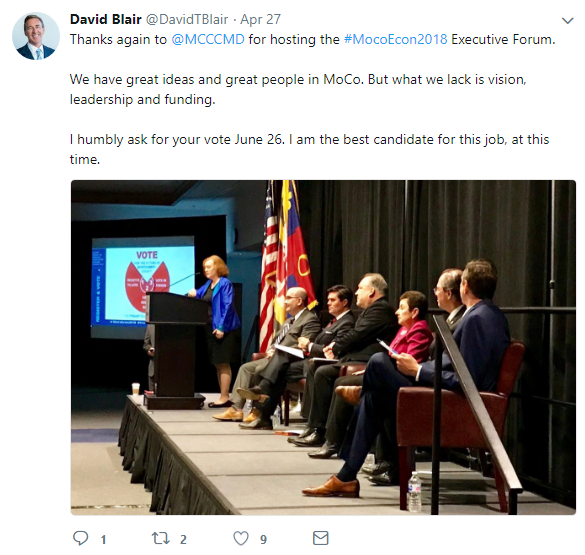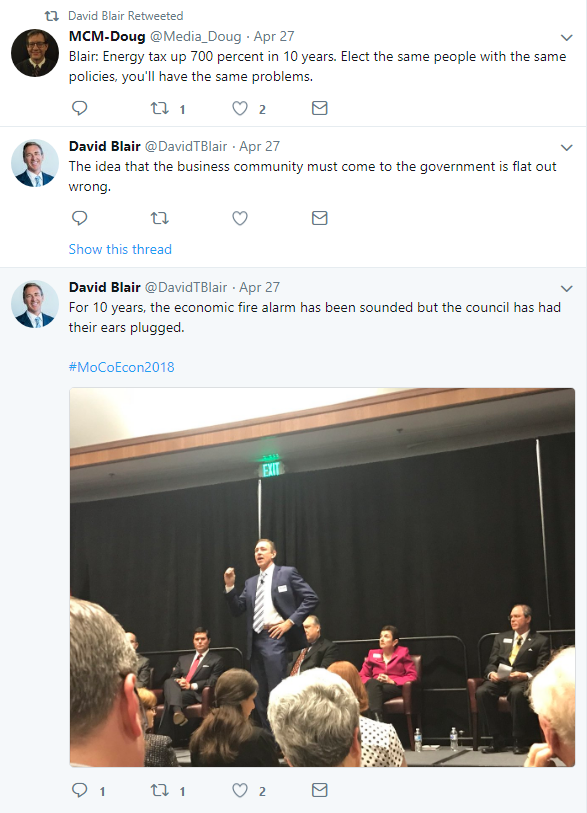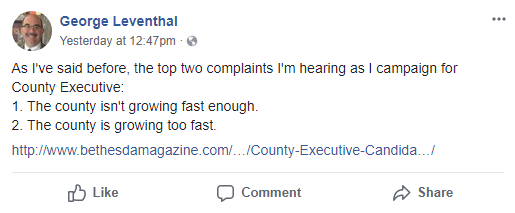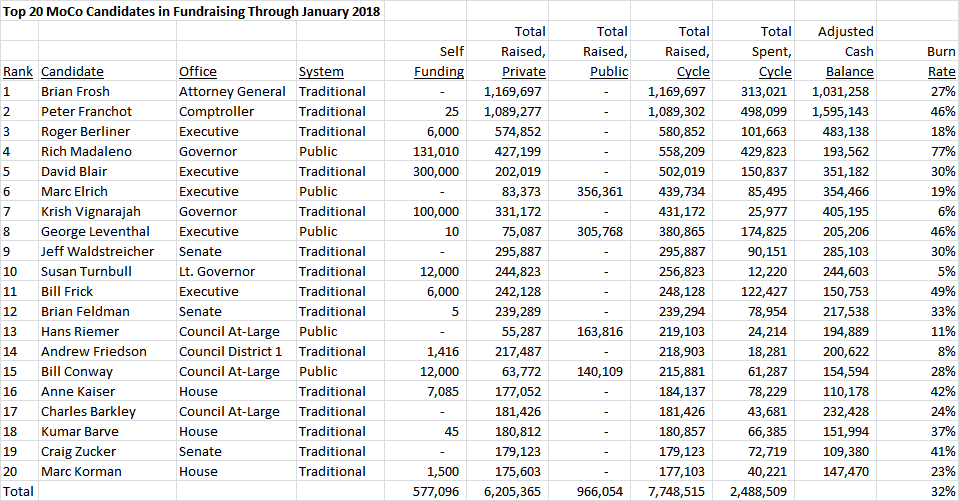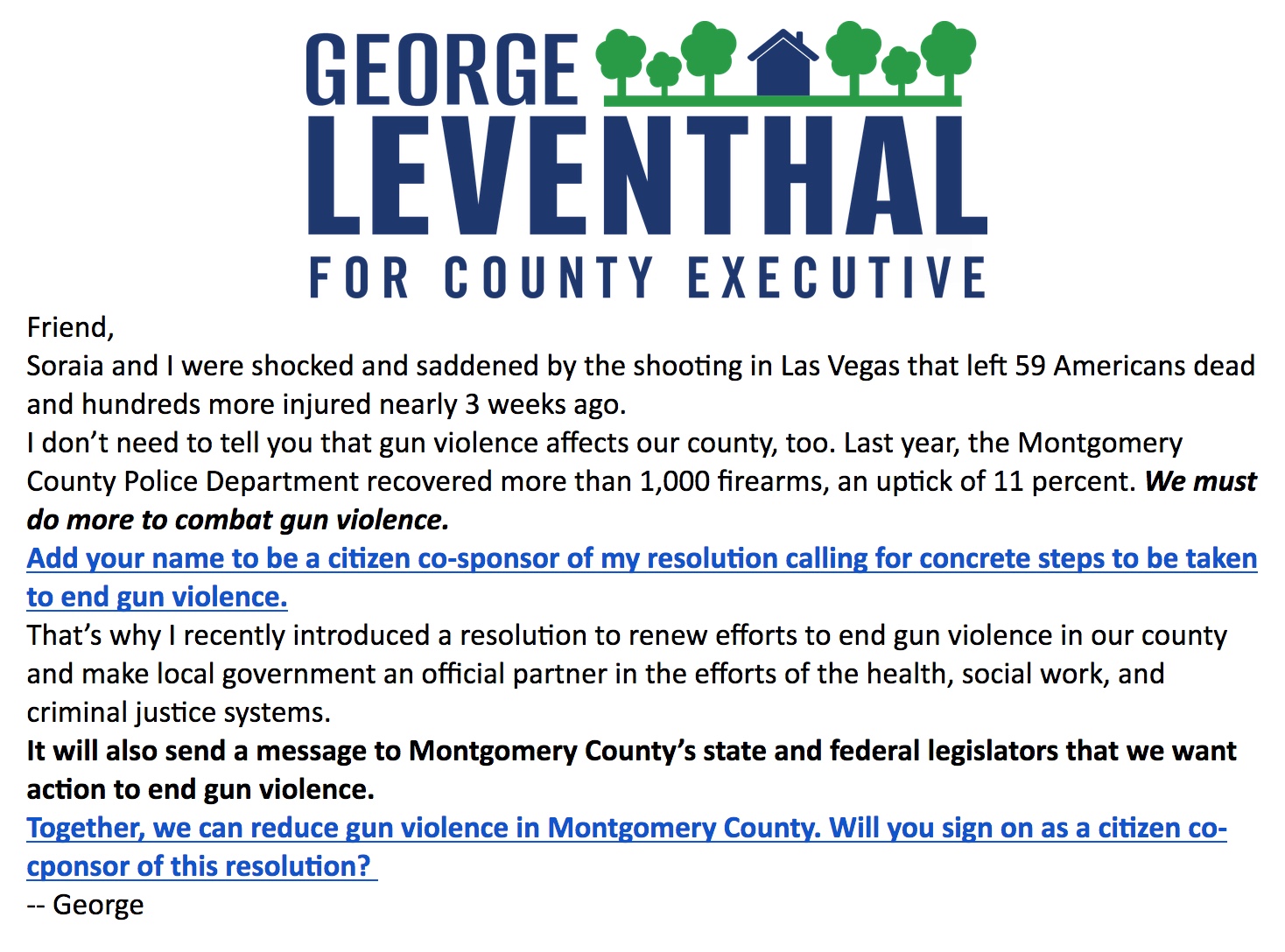By Adam Pagnucco.
The Washington Post recently published an article declaring that the contest to succeed County Executive Ike Leggett was seen as “anybody’s race.” Pshaw! One of two candidates will win it. One of them is Council Member Marc Elrich, who finished first in the last two Council At-Large primaries and is nearly sweeping progressive endorsements. The other is…
We don’t know yet. And we don’t know if we ever will.
During the 2016 Congressional District 8 race, your author called up one of the smartest people in state politics we know. This fellow lives outside MoCo but he tracks all parts of the state and has sources everywhere. When we asked him who was going to win, he said, “When I talk to the various campaigns, all of them say they’re gonna be the last one at the end along with Jamie Raskin. When I hear that over and over, when I see that they all think that Jamie is the man to beat, that leads me to think Jamie will win.” That dynamic is going on now in the Executive race.
Elrich’s long-time message combining opposition to development with far-left progressivism has earned him an overlapping base of land-use voters, liberals and Downcounty residents, especially in and near Takoma Park, where he served 19 years on the City Council. In the 2014 Council At-Large race, Elrich finished first in every council district except 2 (where he finished second to Nancy Floreen) and first or second in every local area in the county except Damascus and Laytonsville. He finished first in 138 of 251 precincts. In the 2010 Council At-Large race, Elrich finished first in all five council districts and in every local area in the county except Cabin John, Damascus, Darnestown and Laytonsville. He finished first in 166 of 243 precincts. No other MoCo politician running for county office in this cycle has a base of this kind.
How did he assemble it? For many years, Elrich has been assisting residents who oppose master plans all over the county. And whether they won or lost, those development opponents came away from the fight with Elrich as their hero. Here is an illustration: an email sent out by the East Bethesda Citizens Association on 6/2/16, on the eve of the council’s consideration of the Downtown Bethesda Master Plan, describing their meeting with Elrich and calling for action:
A year later, Elrich cast the lone vote against that master plan as he has with several other plans. This plan’s opponents have now been incorporated into Elrich’s base – assuming they were not part of it already.
While other candidates struggle to attract volunteers, Elrich’s volunteer base is well established. In 2014, the campaigns of Elrich and his ally, Beth Daly, posted poll coverage sign-ups on Signupgenius.com. They were able to recruit coverage on 67 precincts, many on more than one shift, with particular strength in the voter-rich areas of Silver Spring, Takoma Park and Leisure World. No one other than the Apple Ballot could touch this. Now that he is running for the county’s highest office, how many precincts will Elrich be able to cover?
Among the influencers and highly informed activists, this election is rapidly becoming defined by whether you’re with Elrich or not. If you don’t believe us, check out the Council District 1 candidates. They’re an interesting group that collectively spans the differences of opinions in the county district containing the most Democrats. Bethesda Magazine reporter Andrew Metcalf asked them during a recent debate for whom each was going to vote in the Executive election. After significant prodding, here’s how the candidates responded:
Bill Cook – would vote for Marc Elrich
Pete Fosselman – undecided; wouldn’t vote for Elrich
Andrew Friedson – undecided; disinclined to vote for Elrich
Ana Sol Gutierrez – torn between Elrich and George Leventhal
Jim McGee – would probably vote for Elrich
Reggie Oldak – refused to say; would not vote for Elrich
Dalbin Osorio – would vote for Elrich
Meredith Wellington – undecided
All of the non-Elrich candidates have potential as well as challenges. Council Members Roger Berliner and George Leventhal are running on their experience and qualifications. (Disclosure: your author respects both but supports Berliner.) Berliner is trying to get known outside his council district and Leventhal has been severely out-polled by Elrich in the last two elections. Delegate Bill Frick, former Rockville Mayor Rose Krasnow and businessman David Blair are the fresh faces. But they are little-known in most parts of the county and Blair started as a complete unknown. All of these candidates have a long way to go and each of them is in the others’ way.
To contrast with Elrich effectively, a non-Elrich candidate needs to hit this sweet spot dead-on: “We live in a great county, but we can be even better. Here are some ways we can improve.” That involves a bit of threading the needle for the two council incumbents. It’s understandable that they might react to critiques of the county’s economic performance as criticism of their records, but they should think of it like this: every Executive leaves unfinished business for the next Executive. Ike Leggett inherited his share of problems from Doug Duncan, who in turn inherited some issues from Neal Potter. This is entirely normal, so who is the best choice to lead in the future? As for the non-incumbents, they aggressively point to the need to improve, but they tend not to have many specific proposals to get better because they don’t know the history and operations of county government as well as the two Council Members. To be fair, how could they? If no one hits this sweet spot, that leaves Elrich as the only candidate with a crystal-clear message that is distinct from the others. Those who hear Elrich’s message and agree with it are less likely to peel off to someone else than tentative supporters of the other candidates who might change their preferences between them.
One more thing: we wouldn’t be surprised if most, if not all, of the non-Elrich candidates have polled. If so, they all probably found similar results. And so they could all tailor their messages in similar ways and maybe even say the exact same things. That would blur the differences between them and make Elrich stand out even more. This may already be happening as Berliner, Blair and Frick all repeatedly mentioned “innovation” at last Friday’s Executive forum. Was that a coincidence?
If questioned privately, we bet all of the non-Elrich candidates would grudgingly admit that it’s a problem that five of them are in the race. Each of them wants to be the person who gets to take on Elrich one-on-one. So each of the five is looking at the others and saying, “If YOU all get out of the way, I can beat Elrich.” But no one is dropping out because they all think they have a shot. The big winner from this is – you guessed it – Marc Elrich.
One non-Elrich candidate needs to emerge from the pack and consolidate everyone that is not in Elrich’s camp. If that happens, Elrich is beatable. But if nothing changes and this election continues down the path it is on, Elrich will win with less than 40% of the vote.

